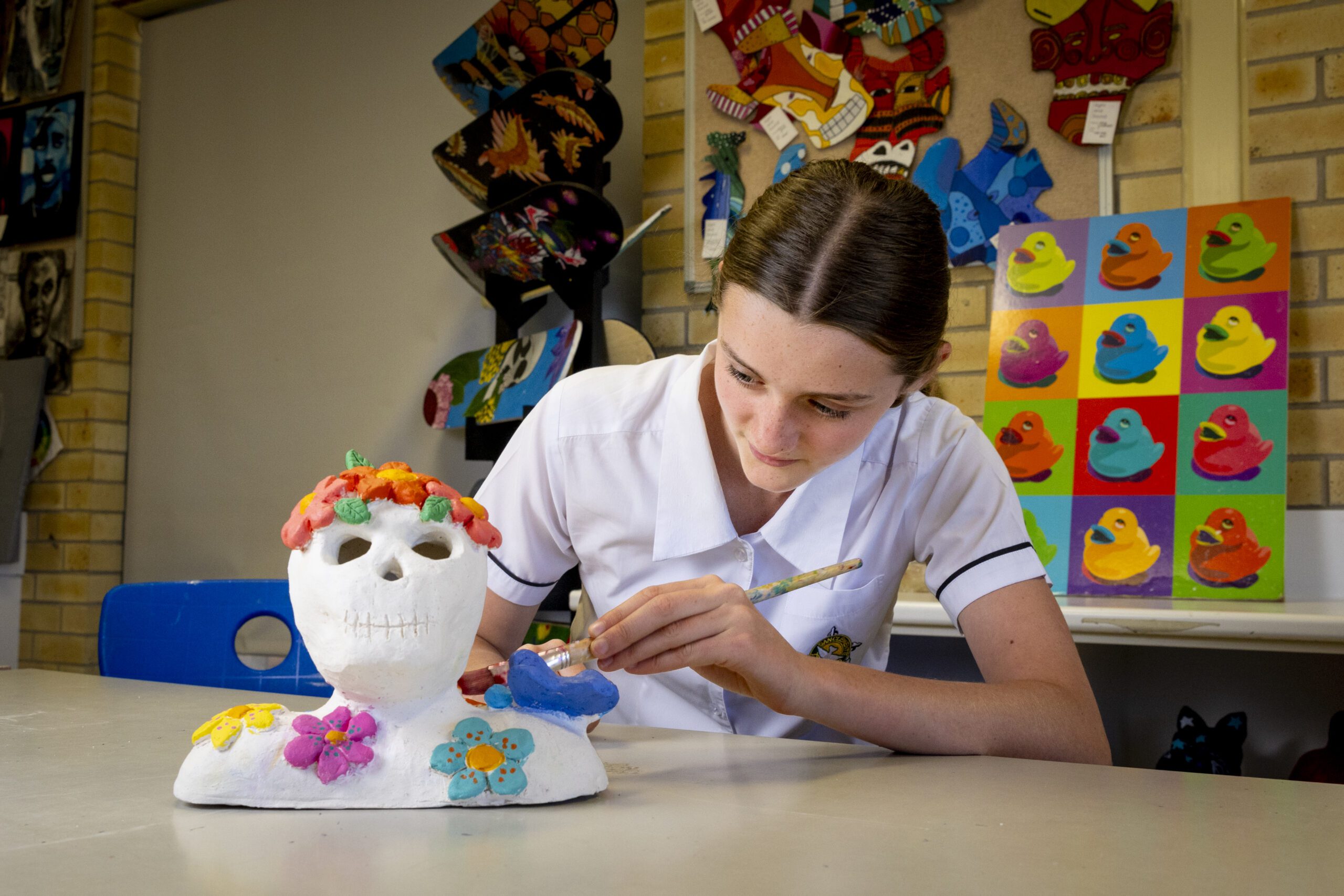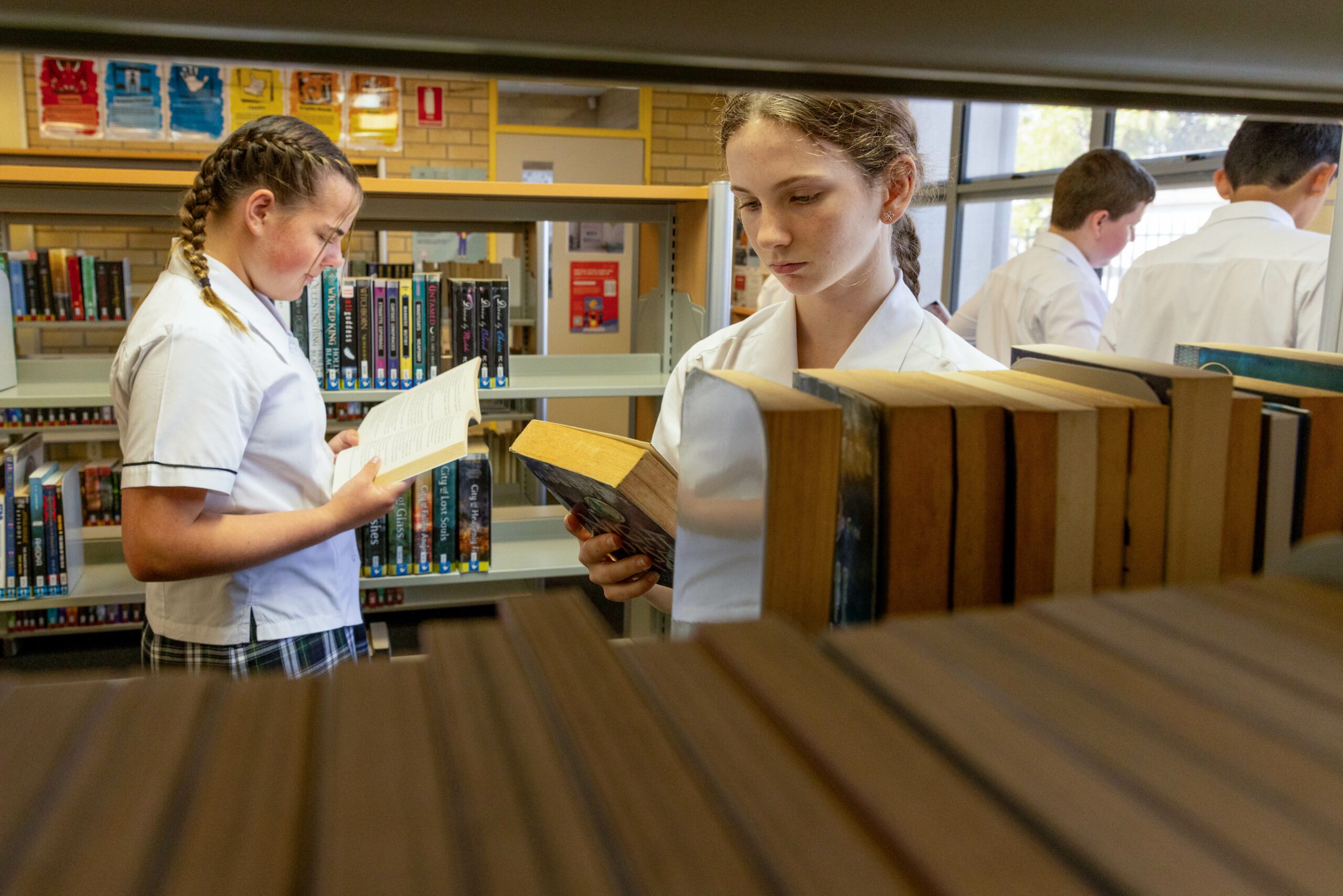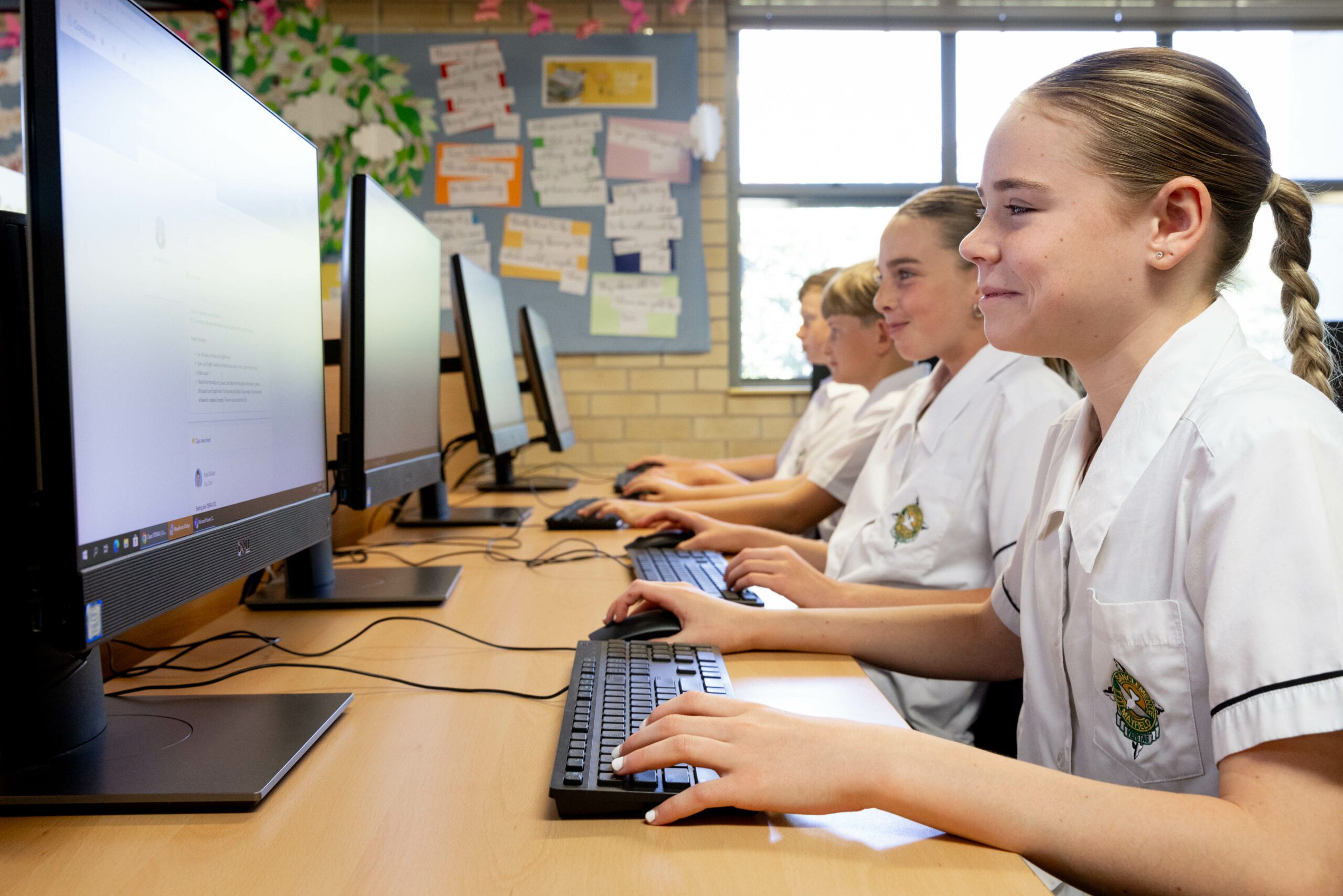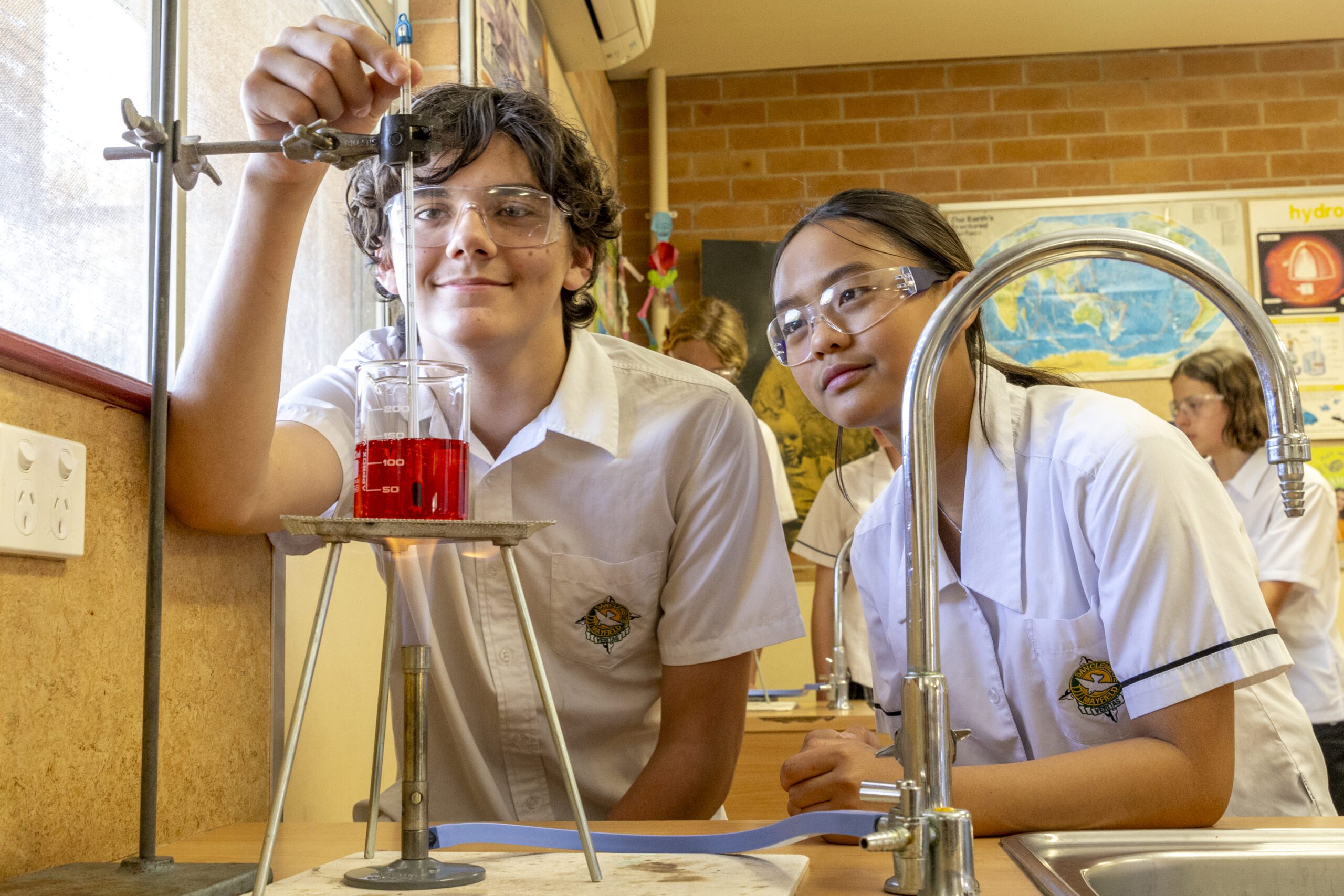
Curriculum
We are committed to developing a genuine love of learning in our students. Our young people today belong to an ever-changing world and it is important that they are equipped with the skills, knowledge and capacity to be successful learners.
Our vision is to develop confident and independent students who are lifelong learners, problem solvers, and collaborative, critical and creative thinkers.
San Clemente
Key Learning Areas
Teaching and Learning at San Clemente is visible, measured and continually evaluated so that students may achieve optimum academic success. Teaching and Learning at San Clemente is vibrant, inclusive, supportive, welcoming and a pillar that defines the community.
Religious Studies
Religious Studies invites students to appreciate the value of Catholic faith and to respect the other faiths and worldviews that are found in Australia’s diverse society.
Students learn the significance of Catholic beliefs, sacred scripture, prayer, ritual, sacraments, and ethics for the faith journey of believers, and show their understanding by participating respectfully in a variety of prayer experiences, including spiritual reflection days, school liturgies and school masses.
Religious Studies Leader of Learning:
English
The English Faculty is committed to developing each student’s potential as an effective communicator. Our programs give considerable scope for achieving necessary literacy outcomes. Students are provided with the opportunity to study a range of texts, from pre-twentieth century to the contemporary, Australian, including First Nations literature, Asian literature, media and multi-media texts.
English Leader of Learning: Belinda Dempsey
Mathematics
Mathematics is one of the most vital components of a child’s education. At San Clemente, Mathematics is graded across all years, in which students are placed in a class reflective of their ability. This enables high-achieving students to be further challenged, while giving struggling students more access to the necessary help required to further improve.
The Mathematics faculty promotes the use of technology in the study of Mathematics wherever possible. The increasing use of technology has been proven to provide fantastic benefits in the teaching of Mathematics.
Mathematics Leader of Learning: Helen Wilks
Science
Science in Stage 4 (Years 7 and 8) provides an introduction to general scientific concepts programmed around the areas of Earth and Space, and the Physical, Chemical and Biological Worlds as per the new Australian Curriculum. Students are given access to ideas, taught new skills, and encouraged to explore their world through the eyes of a scientist in the hope they will broaden their understanding and develop the critical thinking skills needed in the higher years.
Stage 5 (Years 9 and 10) builds upon the concepts introduced in Stage 4, refines skills, and delves more deeply into the nuances of Science – looking at the larger ideas, the topical and occasionally controversial issues that impact the scientific community, whilst gaining a greater understanding of the interconnectedness and intricacies of higher level concepts in preparation for senior school.
Science Leader of Learning: Julia Nolan
HSIE
Human Society in its Environments asks learners to think, talk and create ideas/artefacts/recommendations to address and learn from issues, both past and present, in Australian and Global environments. HSIE encompasses the Key Learning Areas of History, Geography in Years 7 -10 and elective Commerce through years 9 and 10.
At San Clemente, learners develop their understanding of History and Geography in a program designed around each semester. Learners enrich their knowledge of History in one semester and then study Geography in the alternate semester. Timetabling the Key Learning Areas in this manner allows learners to develop their skills and understanding of key concepts with greater continuity, resulting in better achievement and learning outcomes.
HSIE Leader of Learning: Michael Flanagan
Technology and Applied Studies
All students study a Mandatory TAS course in Stage 4, Years 7 and 8 where they rotate through four different TAS subjects, one each term.
They can then choose an elective course in Stage 5, Years 9 and 10.
Technology and Applied Studies Leader of Learning: Gillian Rutherford
PDHPE
The Personal Development, Health and Physical Education Faculty at San Clemente is a dynamic department that develops our student’s capacity to enhance personal health and wellbeing from a Catholic perspective. Our department fosters an enjoyment of an active lifestyle, maximises movement potential, encourages teamwork and nurtures the attitudes that will empower students to advocate a healthy lifestyle. We are committed to providing students with a well-rounded, balanced education, focussing on academic, physical, social, spiritual and recreation needs. Our units of work centre on encouraging and enabling students to make informed decisions related to health, physical activity, lifestyle and life planning.
PDHPE Leader of Learning: Mick Byrne
Creative and Performing Arts
At San Clemente, Creative and Performing Arts programs on offer reflect our view that the Arts are an integral aspect of whole school curriculum. Through participation and study in Arts areas such as Music, Drama and Visual Arts, we provide students with unique opportunities to create, reflect, challenge, respond, critique, present, and celebrate across a range of media and contexts.
Creative and Performing Arts Leader of Learning: Kate James
Languages
French
The study of a modern language is a highly valuable experience. San Clemente offers French, to enable students to view life and the world through the medium of other languages and cultures. We begin to see world problems and life situations through other people’s eyes. The study of French in Stage Four introduces students to the skills of listening, speaking, reading and writing in the language as well as exploring aspects of the cultural life of the people. Proficiency in a language means more than just the ability to use the language – it also requires an understanding of cultural factors. French is available as an elective in Stage Five.
The course is divided into two areas:
- Study of the language.
- Study of the country, people and customs.
The language
Students will learn how to communicate in a variety of situations, engage in conversations, comprehend both written and oral forms and express themselves in written form. Students will gain a clearer understanding of English as well, as English grammar is constantly reinforced. A Language is an ACTIVE subject. There is a great deal of opportunity for conversation, role-plays, games, singing etc.
The culture
Each language topic has a cultural aspect, through which students will gain an overall view of the country and an understanding of the lives of the people.
Excursions
Students participate in a variety of excursions, depending on availability and course costs. These can include a meal in a restaurant, museum and art gallery exhibitions, and other cultural activities. Opportunities are also available for students to participate in verse speaking and speech competitions.
Creative and Performing Arts Leader of Learning: Kate James
Learning Support
Central to San Clemente is the specialised help for students with learning difficulties, English as an Additional Language or Dialect (EAL/D), and Gifted and Talented students.
The Feldt Learning Centre
The Feldt Centre is staffed by a Learning support team of Special Education Teachers, EAL/D Teacher, and Learning Support Assistants (LSAs). This dedicated staff also liaises with our pastoral support team and psychologist in matters of pastoral care.
The Feldt Learning Centre is not limited to students who are “struggling” although this is a fundamental part of our work. It is also available for any student who may need help with their work, assignments or assessment tasks. Printing facilities are also available. So if you feel your child may need help with an assignment or assessment then please ask them to visit the Feldt Centre and the staff will assist.
The Feldt Learning Centre is open from 8.15 am and at both recess and lunch for assessment completion. Teachers may also refer students to the Learning Centre for intensive intervention with one of our specialised learning support teachers.
Our Feldt Learning Centre is truly a place for all, though the core of what takes place is assisting students with special or specific needs, both with diagnosed disabilities or otherwise. The Learning Centre gets tremendous support from mainstream teachers some of whom work in the centre on a rostered basis and others who volunteer their time.
Aboriginal Education
San Clemente has a vibrant Aboriginal student population who are supported and encouraged in their endeavours and academic studies. Acedemic, Cultural and Community support for Aboriginal students is continuous and individualised at San Clemente. We are proud of the many opportunities provided to all students to increase cultural knowledge of and pride in Aboriginal and Torres Strait Islander cultures.
Library
The San Clemente Library, the resource centre for the school. The collection includes books, audiobooks, ebooks and online videos. Students use the computers to access the library catalogue as well as the internet. The library service and the systems for accessing information support and enhance teaching and student learning, as well as satisfying social, recreational and cultural needs.
Oliver is our Library catalogue which can be used to search for resources in the Library collection.
Access Sora ebooks and audiobooks on a smartphone or your laptop. Our school Library is a member of a huge Library called ACEN Member Collection.
Access ClickView educational videos for teaching and learning.




NAPLAN
All students in Years 7 and 9 in Australia are required to sit the National Assessment Program Literacy and Numeracy (NAPLAN). NAPLAN takes place over three days in the second week of March each year with testing in Literacy (Writing, Reading and Language Convention) and Numeracy (non-calculator and calculator). Parents and the school will receive a statement of performance. The school uses NAPLAN results to indicate future planning and teaching needs.
Co-Curricular
At San Clemente, we continually aim to provide the students with rich and diverse experiences. The students may avail themselves of opportunities to compete in several competitions, some of which include the University of Newcastle’s Science and Engineering Challenge, the Aurecon sponsored Bridge Building National Competition, The ICAS Science Competition and the International Robocup where students program robots to complete a range of challenges.


Vocational Education
Vocational Education and Training (VET) is a recognised option for students to gain technical knowledge and workplace skills to assist their transition to the world of work. This assists students to determine, at an early stage, if they are suited to and would like to follow particular career pathways.
San Clemente facilitates a well-supported Vocational Education and Training program and works closely with TAFE to enable students to succeed in their chosen endeavours.